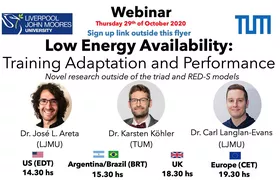How does an athlete's metabolism and physical performance react to deficient calorie intake and energetic stress? An international online seminar on Thursday, 29 October 2020, is set to address this very question. Prof. Dr. Karsten Köhler, Head of the Professorship of Exercise, Nutrition and Health, will speak on the topic: “Can increased dietary protein rescue the endocrine response in the low energy availability state?”.
In his research, Prof. Köhler focuses on the question of how nutrition and exercise can be combined to maintain or even optimize human health and performance. Particular emphasis will be placed on the effects of exercise and calorie restrictions on the composition of the body and the human metabolism. A series of laboratory and field studies on the effects of low energy availability on hormonal balance were carried out for this purpose.
“The athletes have a high calorie turnover due to their sporting activities, but in some cases they cannot and do not want to consume as many calories as they usually would”, states Prof. Köhler. “However, if one does not provide one's body with enough energy, a deficit occurs that has long-term effects, for example on bone density or menstrual bleeding in women, which may then cease. We were able to show for the first time that the body reacts differently, for example during weight training, when it has to do it under deficient conditions such as these”.
The organizer of the seminar, Dr. José Areta, lecturer at Liverpool John Moores University, will address the question “How does low energy availability affect exercise capacity and training adaptation in endurance athletes?” His research examines the effects of simultaneous low energy availability and aerobic training. Some of his earlier research has shown that low energy availability downregulates muscle protein synthesis. This inhibits the construction of new proteins and the production of muscle tissue and muscle mass. Research has also focused on the interaction between macronutrient intake and adaptation to training in endurance sports. These tests are, in some instances, carried out with the participation of elite and professional endurance athletes.
In the online seminar, Dr. Carl Langan-Evans, also a scientist at Liverpool John Moores University, will discuss the “Effect of low energy availability on psychophysiological parameters and physical performance in combat sports athletes”. His current research is specifically focused on the formulation and modulation of ergogenic nutritional aids for athletic performance, i.e. food components with (allegedly) performance-enhancing properties. In addition to his work at the university, Dr. Langan-Evans advises a number of professional and Olympic combat sports athletes.
The event is based on a recent publication in the “European Journal of Applied Physiology” (Impact Factor 2.580) entitled “Low energy availability: history, definition and evidence of its endocrine, metabolic and physiological effects in prospective studies in females and males”.
“With the help of the online seminar, we would like to explain the issue of the deficient state and demonstrate the consequences of this problem to trainers, athletes and scientists”, Prof. Köhler explains the objective of the event, which is being organized with the help of the video conferencing system “Zoom”. Registration is still possible via the following link.
To the registration for the online seminar „Low Energy Availability: Training Adaptation and Performance“
To the homepage of the Professorship of Exercise, Nutrition and Health
Contact:
Prof. Dr. Karsten Köhler
Professorship of Exercise, Nutrition and Health
Georg-Brauchle-Ring 60/62
80992 München
Telefon: 089 289 24488
E-Mail: karsten.koehler(at)tum.de
Text: Romy Schwaiger
Photo: Professorship of Exercise, Nutrition and Health
